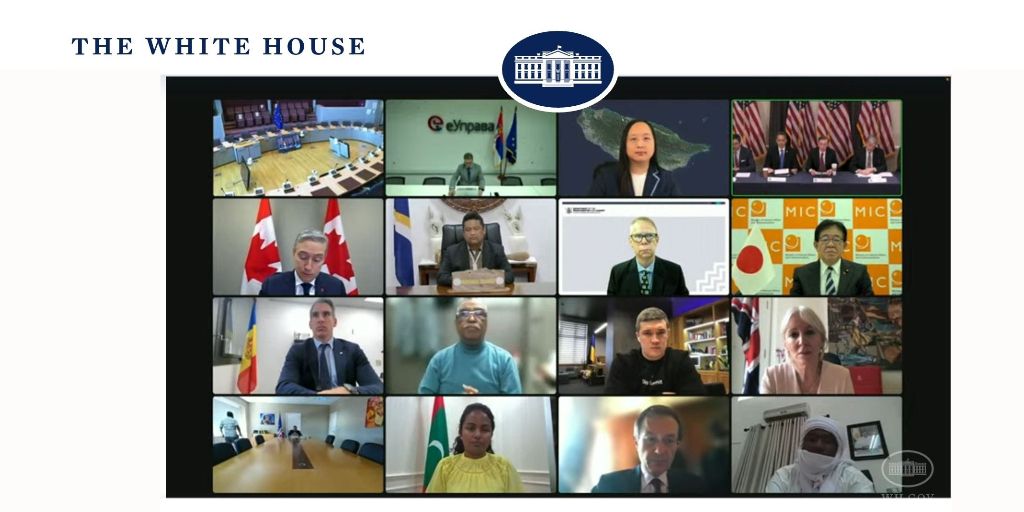International Coalition Launches Declaration for the Future of the Internet
Justin Hendrix / Apr 28, 2022
Some ambient noise from one of the international participants on a Zoom call led by the White House this morning briefly interrupted the official proceedings.
"I think somebody might have to go on mute, which you cannot have a meeting on the future of the internet without asking somebody to go on mute," said Jake Sullivan, the National Security Advisor to U.S. President Joe Biden, to laughter. So began an otherwise serious virtual occasion announcing a Declaration for the Future of the Internet, a statement of values and goals for how democracies can maintain a free and open internet, and take advantage of the benefits of connectivity while addressing its downsides.
"It's no secret that the internet and its future has become a key part of the battle for democratic principles and democratic principles, and to push back against democratic backsliding around the world," said Sullivan. "But this is not really for the collection of countries who are gathered here today about what we are against. It's about what we are for- it's about an affirmative vision and an affirmative vision and that's the heart of the declaration that all of us will be signing and discussing today."
The two and a half page document is largely a statement of broad values and goals. It covers issues such as the protection of human rights and fundamental freedoms, the promotion of a 'global' internet, accessibility, trust in the digital ecosystem, and the benefits of multi-stakeholder governance.
"Partners in this Declaration intend to work toward an environment that reinforces our democratic systems and promotes active participation of every citizen in democratic processes, secures and protects individuals’ privacy, maintains secure and reliable connectivity, resists efforts to splinter the global Internet, and promotes a free and competitive global economy," it says.
One notable participant in the meeting was Mykhailo Fedorov, Vice Prime Minister and Minister of Digital Transformation of Ukraine. He brought the struggle for democracy against authoritarianism into sharp relief:
Already for two months Ukraine has continued its battle for our future, our democratic choice, and our survival as a nation. We are fighting against a brutal and primitive aggressor. We are living in a strange time. One part of the world is on the way of standing technology for progress, democracy and sustainable development, while another part of the world is trying to use modern technologies for genocide We can see how Russian propaganda on a new technological level, including using the internet, is transforming people into zombies that are ready to kill , are ready to rape children and ready to destroy whole cities. A striking example of disinformation campaigns is the case of Bucha. The truth about the hundreds of people killed has been questioned by Russian media. They covered the truth and well documented facts as fake, like all the Syrian people murdered by the Russian army were not real. But the Western world uses tech for good. Photos from satellites have proved a real genocide happened in Bucha. You help us to share this truth, and truth is the only efficient weapon against Russia. That gives me a new sense and understanding of the importance of free and true information.
The United Kingdom's Nadine Dorries, Secretary of State for Digital, Culture, Media and Sport, used her remarks to promote the UK's proposed Online Safety Bill.
"I believe we are at a turning point in the digital age," said Dorries. "We're entering a new chapter where tech companies are held fully accountable for the content on their platforms. That they uphold their own promises to their users to protect people from toxic racist and misogynist abuse, and to protect children from cyber abuse and other harmful behavior."
On a panel discussion following the presentation, panelists framed this moment is the beginning of a new chapter for the approach to and expectations of technology and its relationship to democracies.
Karen Kornbluh, a former United States Ambassador to the Organization for Economic Co-operation and Development and now the Senior Fellow and Director, Digital Innovation and Democracy Initiative at the German Marshall Fund, pointed to the ways in which the "light touch" on regulation is no longer appropriate.
"The internet has obviously changed, it has grown, it has concentrated; and that approach has been central to the way it has grown, but it is clear that the challenges have changed over time," said Kornbluh. Issues around surveillance, competition and security suggest a new approach is necessary going forward.
Marietje Shaake, a former Dutch Member of Parliament in the European Union and now the international policy director at Stanford University Cyber Policy Center, said "we cannot be naive about the promise and the dream of an open internet." She pointed to the ways in which technology now serves as a vector for war, geopolitical competition, manipulation and other actions that undermine the democratic principles outlined in the declaration.
"The stakes are real, the stakes are high," she said.
In its 2021 Freedom on the Net. report, Freedom House, a nonprofit organization founded in 1941 to advance democracy and human rights, noted that in its survey of 70 countries — representing 88% of the global population — most measures are moving in the wrong direction, with global internet freedom on the decline every year since the first report was published just over a decade ago. Likewise, the V-Dem Institute's survey of democracies finds the world continuing its years-long trend towards more autocracy.
Authors
